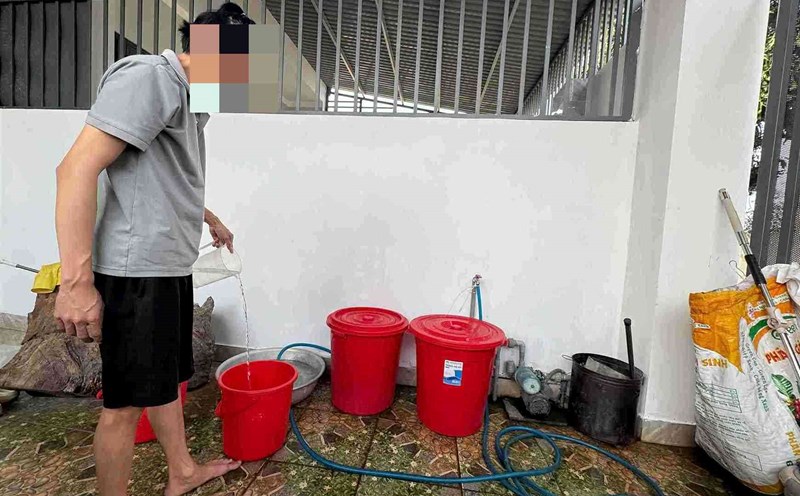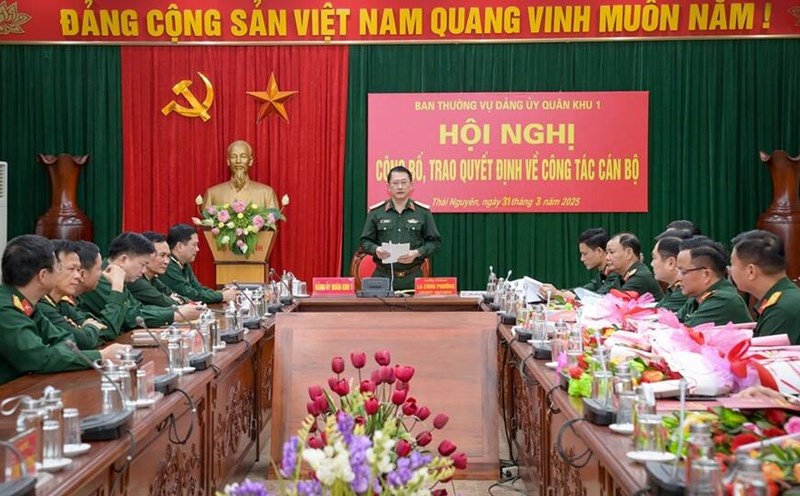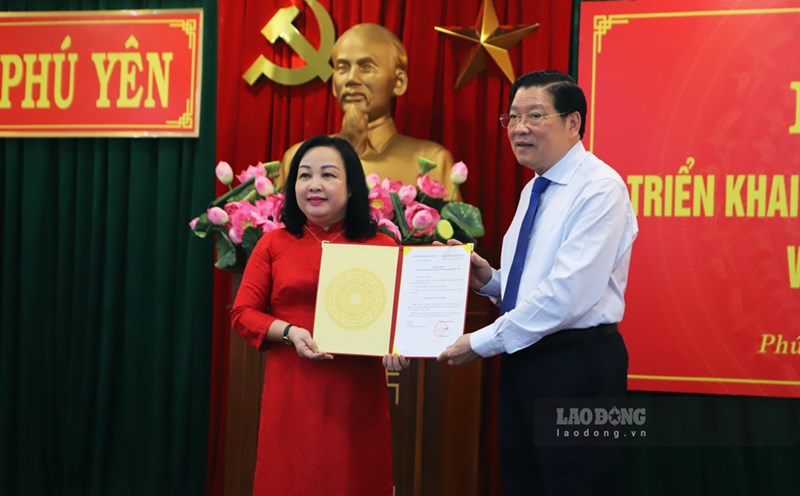10:45: The launching ceremony ended with a strong message about responsibility and opportunities for green transformation.
Green transformation is not only a responsibility in the context of sustainable development, but also opens up important opportunities for businesses to enhance their value, brand reputation and competitiveness in the domestic and international markets.
Following the success of the Launching Ceremony, the Green Transformation Day event series in 2025 will be organized by Lao Dong Newspaper throughout the coming months of April and May, with many in-depth seminars and seminars revolving around practical topics such as "Removing difficulties for green credit flows, green bonds" and "Sustainable energy transition".
Promoting green vehicles requires cross-sectoral coordination and raising people's awareness
10:28: Speaking at the discussion session, Mr. Nguyen Huu Tien - Deputy Director of the Department of Science, Technology, Environment and Construction Materials (Ministry of Construction) - said that encouraging the use of green vehicles does not only depend on economic policies, but requires a series of comprehensive solutions from infrastructure to communication and changing people's behavior.
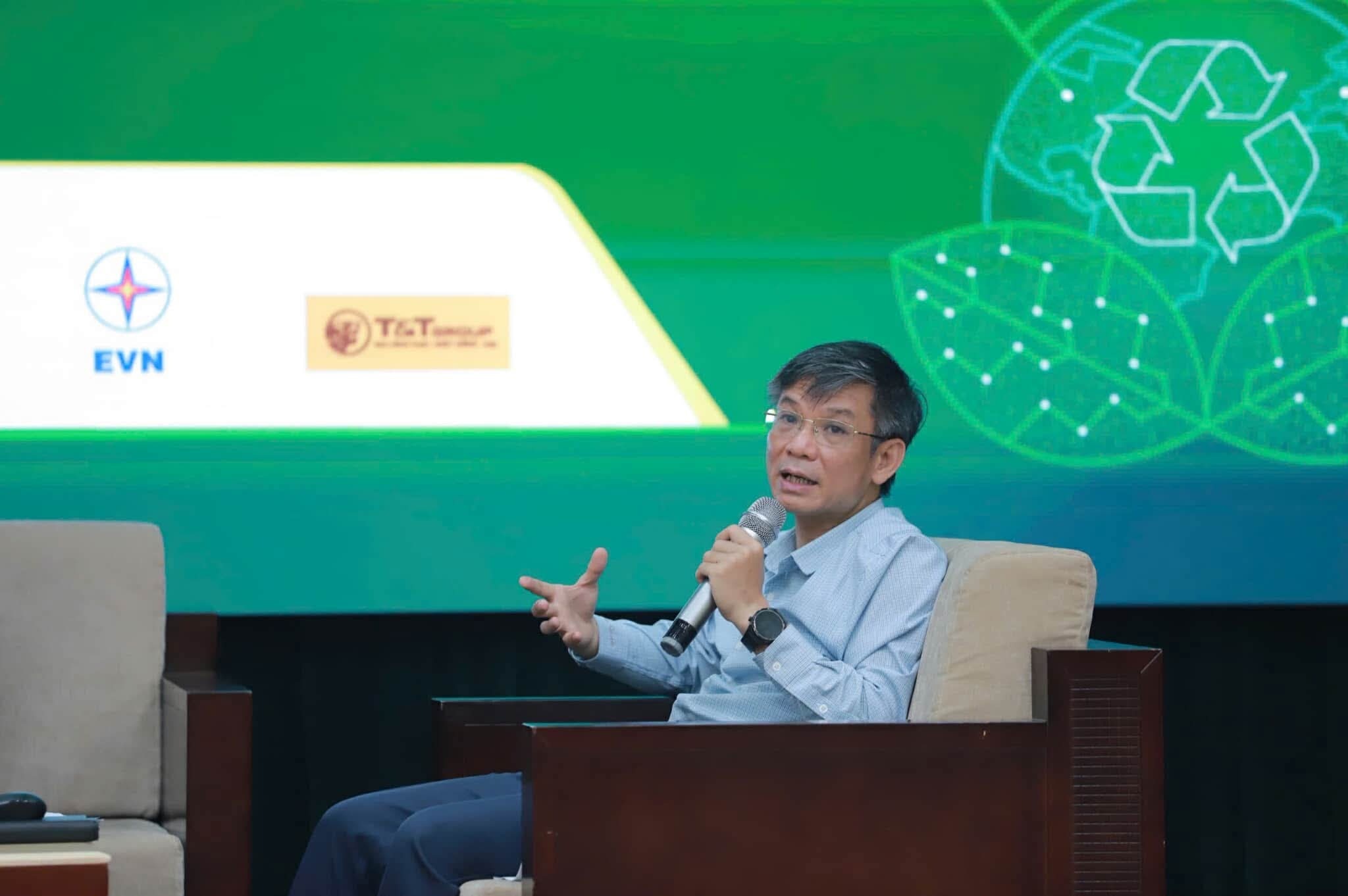
According to Mr. Tien, in recent times, under the coordination of the Ministry of Agriculture and Environment and localities, many initiatives have been implemented. In Hanoi and Ho Chi Minh City, low-emission zones have been initially formed, aiming to limit vehicles with high emissions, while creating favorable conditions for green vehicles.
"The Ministry of Construction has issued a Circular regulating green and clean vehicles" in which priority corridors are created for low-emission vehicles operating in certain areas. On the contrary, vehicles that do not meet green standards will be restricted to traffic in specific planning areas," said Mr. Tien.
Regarding emission standards, the Ministry of Agriculture and Environment has raised the requirements for newly assembled vehicles, setting a high standard threshold to control emissions right from the production stage.
At the same time, Mr. Tien emphasized that the development of electric vehicles requires coordination from many ministries and branches. For example, the Ministry of Industry and Trade is developing a policy on electricity prices for charging stations according to the Government's direction - a factor considered the key to encourage people to switch to using electric vehicles.
In addition, infrastructure standards are also being reviewed to synchronize with the development of electric vehicles. "We are working with relevant units to develop standards for the charging station system at rest stops, bus stations and urban areas. This will help shorten charging time, creating maximum convenience for users, he said.
In the long term, the development of public transport infrastructure, such as urban railways, also needs to be promoted and integrated into urban planning systematically, in order to change the habit of individuals moving to use public transport.
However, Mr. Tien also noted that the success of the green transformation process does not only come from policies or technology, but also depends largely on people's awareness and behavior.
"People need to proactively learn and increase their responsibility in choosing environmentally friendly vehicles. In addition, manufacturers need to play a more active role, not only improving technology but also having to communicate clearly to eliminate existing concerns about the quality, durability or safety of electric vehicles, he recommended.
Green transformation in urban transportation is a process that requires the support of the State, businesses and people. Only when everyone joins in, can we build a sustainable, modern and environmentally friendly transportation system, Mr. Nguyen Huu Tien ended his sharing.
It is necessary to promote domestic consulting resources to support green transformation businesses
10:23: Speaking at the discussion session within the framework of the event "Green transformation - Joining hands for a sustainable Vietnam", Mr. Lai Van Manh - Head of the Department of Natural Resources and Environment Economics (Ministry of Agriculture and Environment) emphasized the urgent role of promoting the capacity of domestic consulting enterprises and research institutes to support the business community to overcome green transformation barriers.
According to Mr. Manh, in the new context, businesses are facing many strict standards and regulations related to sustainable development. For example, the European Union's carbon Border Adjustment Mechanism (CBAM) or the green classification system are increasingly becoming a prerequisite for accessing preferential capital sources, especially in the agricultural sector.
Although these standards aim to support businesses to integrate and develop sustainably, in reality, they also create a lot of pressure especially in terms of certification and appraisal costs, Mr. Manh shared.
One of the outstanding difficulties he pointed out is the almost complete dependence on international independent certification organizations. Currently, domestic organizations do not have enough professional capacity to take on the role of appraisal, forcing businesses to hire foreign organizations at very high costs, ranging from 20,000 to 25,000 USD for each certification, he added.
From that situation, Mr. Manh suggested that it is necessary to soon develop a domestic consulting and quality assessment ecosystem, including improving the capacity of research institutes, professional organizations and businesses providing green consulting services. This not only helps reduce costs significantly for businesses but also promotes proactiveness in accessing and meeting international standards.
This is a systematic issue and needs to be viewed as a shared responsibility. The change in awareness and synchronous participation of management agencies, businesses and the scientific community will be the foundation for forming sustainable solutions, Mr. Lai Van Manh emphasized.
10:13: Dr. Nguyen Quoc Viet: It is necessary to classify and design green credit policies suitable for each group of businesses
Responding to press questions related to credit policies to support green transformation projects, Dr. Nguyen Quoc Viet - economic expert, lecturer at the University of Economics (UEB) - said that perfecting the legal framework and financial mechanisms of the Government, especially policies on credit guarantee and capital mobilization, is a key factor to support businesses in sustainable development.
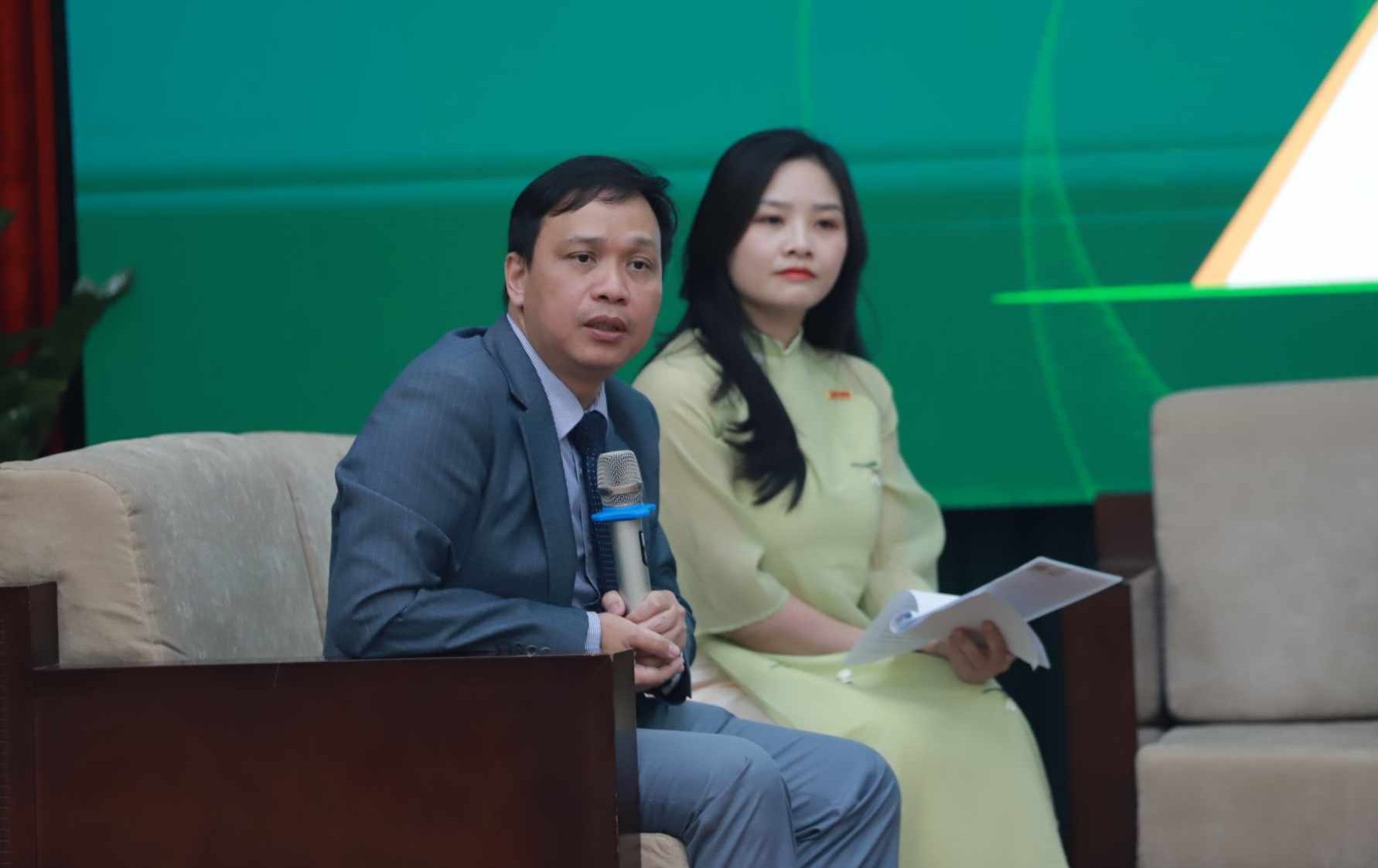
According to Dr. Viet, in recent times, this has also attracted much attention and discussion at major seminars with the participation of domestic and foreign enterprises. He emphasized that for policies to be truly effective, it is necessary to start from classifying the characteristics and models of projects, thereby providing solutions suitable for each group of subjects.
For large-scale projects, the Government has currently had important legal mechanisms such as the Law on Investment and the form of public-private partnership (PPP), allowing the private sector to participate in key infrastructure projects and economic sectors. The PPP model helps the State effectively utilize social capital and reduce financial risks, while improving the efficiency of public project implementation, said Mr. Viet.
However, at the micro level, especially in the fields of agriculture and services, millions of small businesses and farming households are still facing many obstacles in accessing credit. Small loans, lacking collateral, while capital demand is large and increasing. Faced with this situation, Dr. Viet believes that developing cooperative models or production linkages is a feasible solution, helping to focus on capital needs and improve borrowing capacity through the credit guarantee mechanism.
He gave an example from green transformation projects in the agricultural sector: "Instead of each business household lending capital itself, cooperatives can represent many households, thereby increasing the creditworthiness and access to preferential capital from banks or financial institutions".
For large-scale enterprises, especially in industrial parks, Dr. Viet mentioned the opportunity to access international capital sources such as green credit or issue bonds. However, he warned that exchange rate risks are one of the significant obstacles. When the domestic currency fluctuates strongly, debt repayment costs increase, directly affecting the financial efficiency of the project. Therefore, building a mechanism to ensure exchange rate risks or provide financial support from the State is necessary to help businesses feel secure in expanding their investment.
Enterprises themselves also need to proactively implement financial risk management measures, such as using derivatives or exchange rate insurance, he noted.
In the field of renewable energy, Dr. Viet gave a specific example: many businesses want to invest in solar power but are having difficulty because individual projects are small-scale and have difficulty accessing large credit. At that time, industrial park management boards can act as intermediaries, gathering small projects into a large package to increase borrowing capacity and enjoy preferential interest rates.
To make policies truly effective, Dr. Viet emphasized the need for close coordination between agencies such as the Ministry of Finance, the State Bank, the Ministry of Industry and Trade and the Ministry of Natural Resources and Environment. The synchronization from the central to local levels will create a favorable corridor for businesses to implement green projects.

In particular, he believes that classifying needs and business models according to each industry and scale of operations is an important factor to design a "correct and accurate" policy. It is impossible to apply a common policy to all businesses in very different specific context and financial conditions.
Credit guarantee and capital support policies need to be built based on clear classification. At the same time, we need specific solutions on exchange rate risk prevention, appropriate financial tools, and synchronous coordination from authorities to create momentum for Vietnamese enterprises to successfully transform and develop sustainably, Dr. Nguyen Quoc Viet emphasized.
Green transport development requires cross-sectoral coordination and companionship of the whole society
10:01: Mr. Nguyen Huu Tien - Deputy Director of the Department of Science, Technology, Environment and Construction Materials (Ministry of Construction) - emphasized the essential role of green transport in the energy transition process and implementation of Vietnam's commitment to reduce emissions.
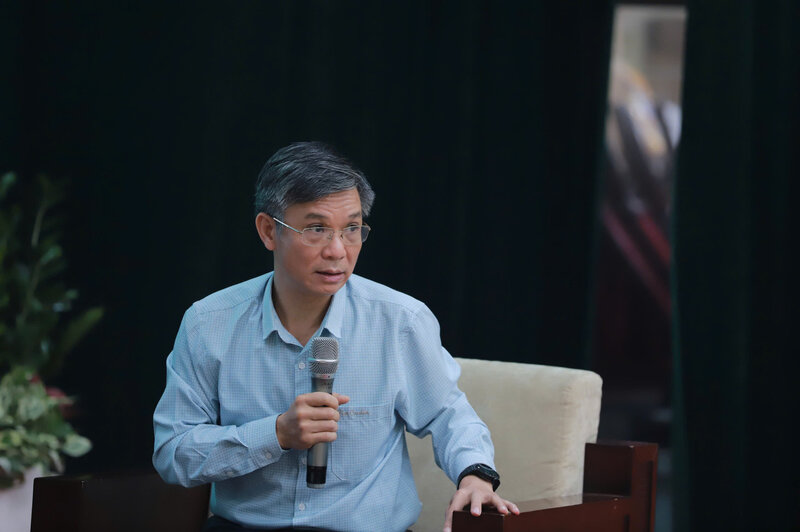
Mr. Tien said that in order to carry out the tasks assigned by the Prime Minister at the COP 26 Conference in 2021, the Ministry of Construction has coordinated with ministries, branches and localities to submit to the Government to issue Resolution 876, approving the national action program on green energy conversion in the field of transportation and reducing greenhouse gas emissions.
Implementing this Resolution, the Ministry has reviewed the policy system and issued many legal regulations to create a corridor for the development of green means of transport. To date, the Ministry has proposed and issued 2 decrees and 38 technical regulations related to traffic safety, including regulations on vehicles using clean energy. "The current legal basis is sufficient for electric vehicles to gradually replace vehicles using petroleum," Mr. Tien affirmed.
In addition, the Ministry also coordinates with relevant agencies to promote regulations on emission standards. An example is Decision 19 approved by the Prime Minister, regulating the roadmap for applying emission standards to motor vehicles. The Ministry of Transport has also issued Circular 53, classifying means of transport and clearly defining identification signs for green vehicles.
According to Mr. Tien, recent years have recorded a positive development of electric vehicles, especially in large cities such as Hanoi and Ho Chi Minh City. We are witnessing a clear shift as major cities develop plans to develop electric buses, install charging stations, and set a goal of completely converting public transport to electricity by 2030 this is an important milestone in improving urban air quality, he said.
In parallel with the policy, the Ministry of Construction is also implementing research and plans to support the expansion of the inter-provincial and inner-city electric bus system, contributing to the completion of the environmentally friendly public transport network. The Ministry has also learned from international experiences from countries such as Korea, China, Thailand, Europe, etc. to make policy proposals suitable to Vietnam's socio-economic conditions.
However, Mr. Tien said that to successfully transform green transportation, there needs to be close coordination between ministries and branches in building financial policies, investment incentives, and most importantly, the participation of the people. The development of electric vehicles cannot only rely on the determination of the management agency. The awareness and real needs of the people will be the decisive factor, he said.
There are still many concerns in society about charging station infrastructure, charging time, cost of use or reliability of electric vehicles. Therefore, he called on manufacturers and media to actively participate, in order to provide transparent information, build trust and promote green consumption behavior.
Mr. Nguyen Huu Tien affirmed: Converting green transportation is not only a task of the Government but also a common responsibility of the whole society. With the support of people, businesses and organizations, I believe that Vietnam will gradually achieve positive results in its journey towards sustainable development".
Green transformation determines the survival of businesses
9:50: After sharing from business representatives, it can be seen that green transformation is not only an urgent requirement but also a decisive factor for the survival of businesses in the new context.
From the perspective of an environmental management agency, Dr. Tran Cong Thang - Director of the Institute of Strategy and Policy on Agriculture and Environment (Ministry of Agriculture and Environment) gave advice to businesses in changing and adapting to the requirements of green transformation.
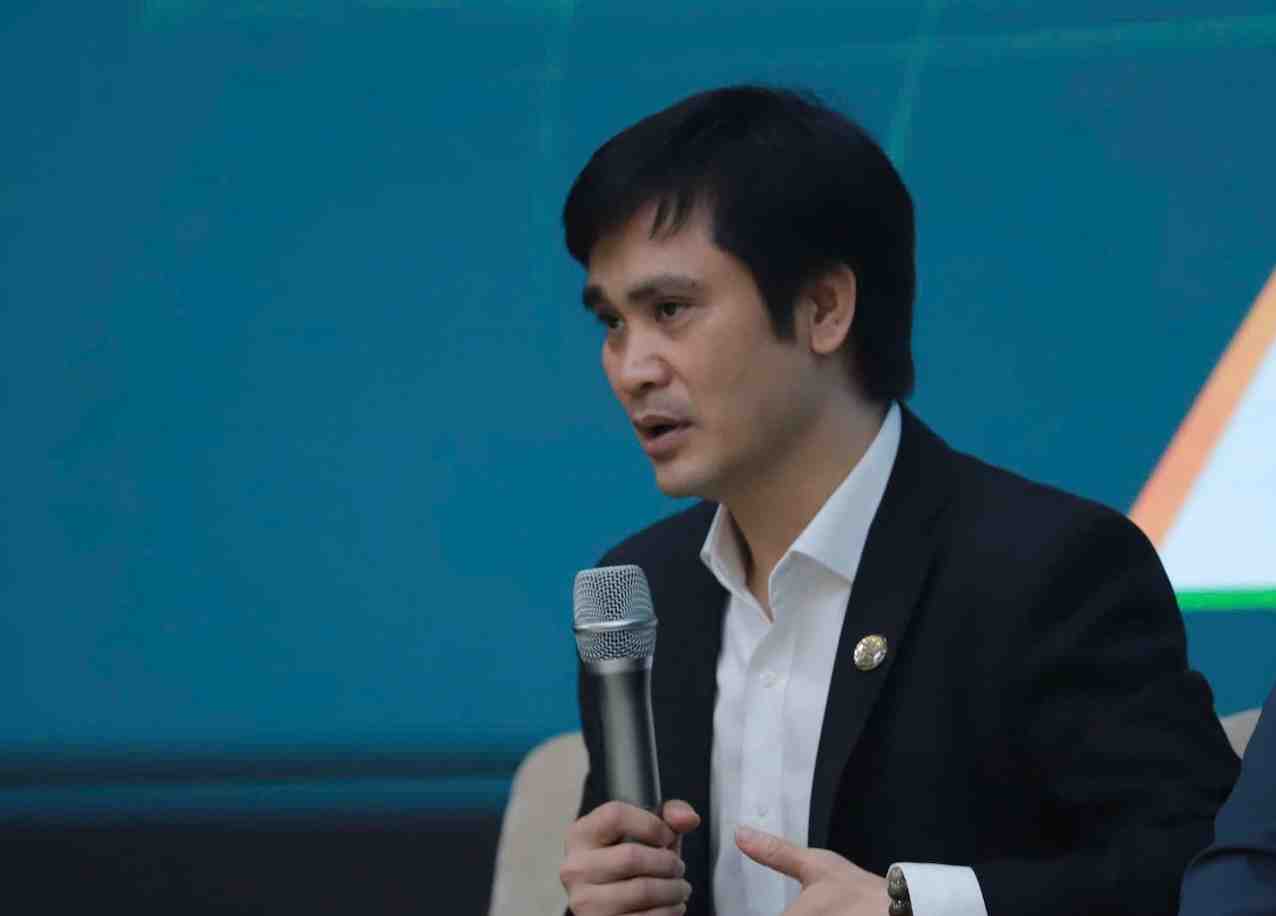
Dr. Tran Cong Thang said that there are three main points that businesses need to pay attention to.
First, businesses need to clearly recognize the mandatory requirements of the market for green transformation. As Mr. Kien analyzed, especially in the agricultural sector, environmental and social criteria are becoming increasingly strict. Enterprises must comply with standards, in which traceability is a mandatory requirement. For the seafood or fruit industry, technical fences are increasing, requiring clear growing area codes and farming area codes. When exporting to international markets, businesses will face inspection and evaluation from partners, and this is the direct competitive pressure.
Second, businesses must be proactive and have a long-term vision in technological innovation. Market policy can change at any time, and if there is no preparation, businesses will fall into a passive position. Investing in technology requires high costs, but if not converted early, businesses may lose competitive opportunities.
Third, social responsibility and environmental protection need to be given top priority by businesses. If businesses continue to abuse chemicals and natural resources, they will not only harm the environment but also destroy themselves. Environmentally friendly and resource-efficient production solutions, such as the Project of 1 million hectares of high-quality rice with low emissions, are practical directions that need to be replicated. The human factor is also extremely important. Enterprises need to focus on training human resources with new skills to meet the requirements of a green economy. The transition from a brown economy to a green economy requires changes in both thinking and working methods, in order to exploit resources more effectively and leave sustainable values for future generations. However, businesses will also face many challenges.
First is the economic efficiency problem. For farmers, profit is still a top concern. They will question whether green products can be sold at a higher price? This is the reason why support mechanisms are needed to ensure output and increase product value.
The second difficulty is related to investment costs. Green transformation requires large capital to invest in new technology, machinery and production processes. Without support from policies or preferential financial sources, many small and medium-sized enterprises will have difficulty implementing it.
In the end, thinking is a big obstacle. Green transformation is only truly effective when it penetrates deeply into the awareness of each business and each employee. This is a process that requires support from authorities at all levels, supporting organizations and businesses themselves. When there are appropriate support policies, businesses will have more motivation to boldly transform and develop sustainably.
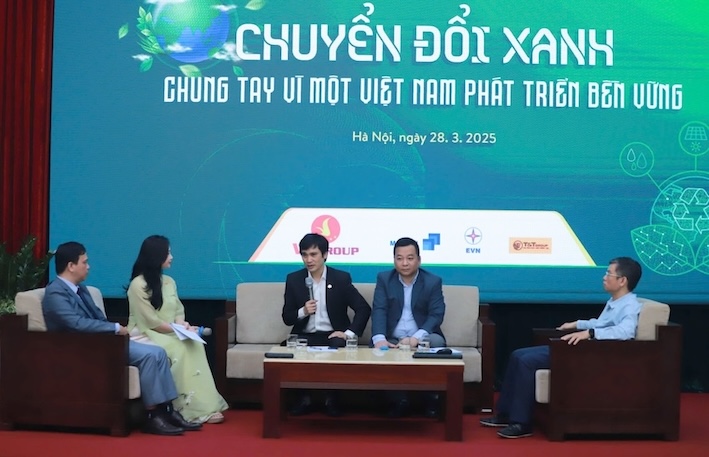
Practical challenges for businesses when participating in Green Transformation
9:49: Speaking at a discussion session within the framework of the event "Green transformation - Joining hands for a sustainable Vietnam", Mr. Trinh Duc Kien - Deputy Director of Ke Go Company Limited - shared the practical challenges that wood manufacturing and exporting enterprises are facing when participating in the green transformation race, meeting strict standards from the international market.
According to Mr. Kien, the requirement for green and sustainable is no longer a trend but has become a mandatory condition in many major markets such as Europe, North America, East Asia and Australia. Especially in the wood industry, these standards are applied throughout the entire product value chain - from input materials to production methods and finished products.
Specifically, many international customers require businesses to use wood materials with sustainable forest management certificates such as FSC or PEFC, and at the same time must prove that the exploitation process does not cause deforestation or loss of forest - in accordance with regulations such as the current EUTR of the EU and the EUDR to be applied in the near future.
During the production process, standards are also tightened with the requirement to apply environmentally friendly technology, no toxic emissions. For example, the EU is implementing a carbon adjustment mechanism (CBAM), forcing businesses to declare greenhouse gas emissions per product unit, said Mr. Kien.
In addition, the labor factor is also a part of the green demand chain. Enterprises must ensure welfare regimes, working conditions in accordance with Vietnamese law and international practices such as BSCI or SEDEX SMETA standards.
In the product stage, the trend of "greening" materials is also increasingly clear. Many product groups are forced to replace materials with environmentally friendly materials, such as disposable eating utensils made of bamboo and paper instead of plastic, Mr. Kien cited.
However, this conversion process is putting great pressure on businesses, especially in terms of costs. Change in technology, production processes and product design significantly increases product prices, making it difficult for businesses to compete, especially in markets that are still loose in environmental requirements, Mr. Kien analyzed.
One of the shortcomings that Mr. Kien mentioned was the shortage of domestic support policies. In Vietnam, many environmentally friendly products have not yet received priority for consumption because there are no specific regulations on the roadmap to limit or ban the use of polluting products such as plastic bags, plastic cups, disposable plastic items, etc.
From practical activities, the representative of Ke Go Company proposed that the Government soon issue a specific roadmap and deadline for banning or limiting the use of environmentally unfriendly products, instead of stopping at voluntary calling campaigns.
In addition, Mr. Kien also recommended prioritizing public procurement of goods and services of enterprises that have invested systematically in green transformation, while reviewing and unifying regulations on the management of wood and forestry products to create conditions for enterprises to prove the legality and sustainability of input materials.
Green transformation is inevitable, but to make businesses implement effectively and sustainably, there needs to be a clear, synchronous legal corridor and substantial support mechanisms, Mr. Trinh Duc Kien emphasized.
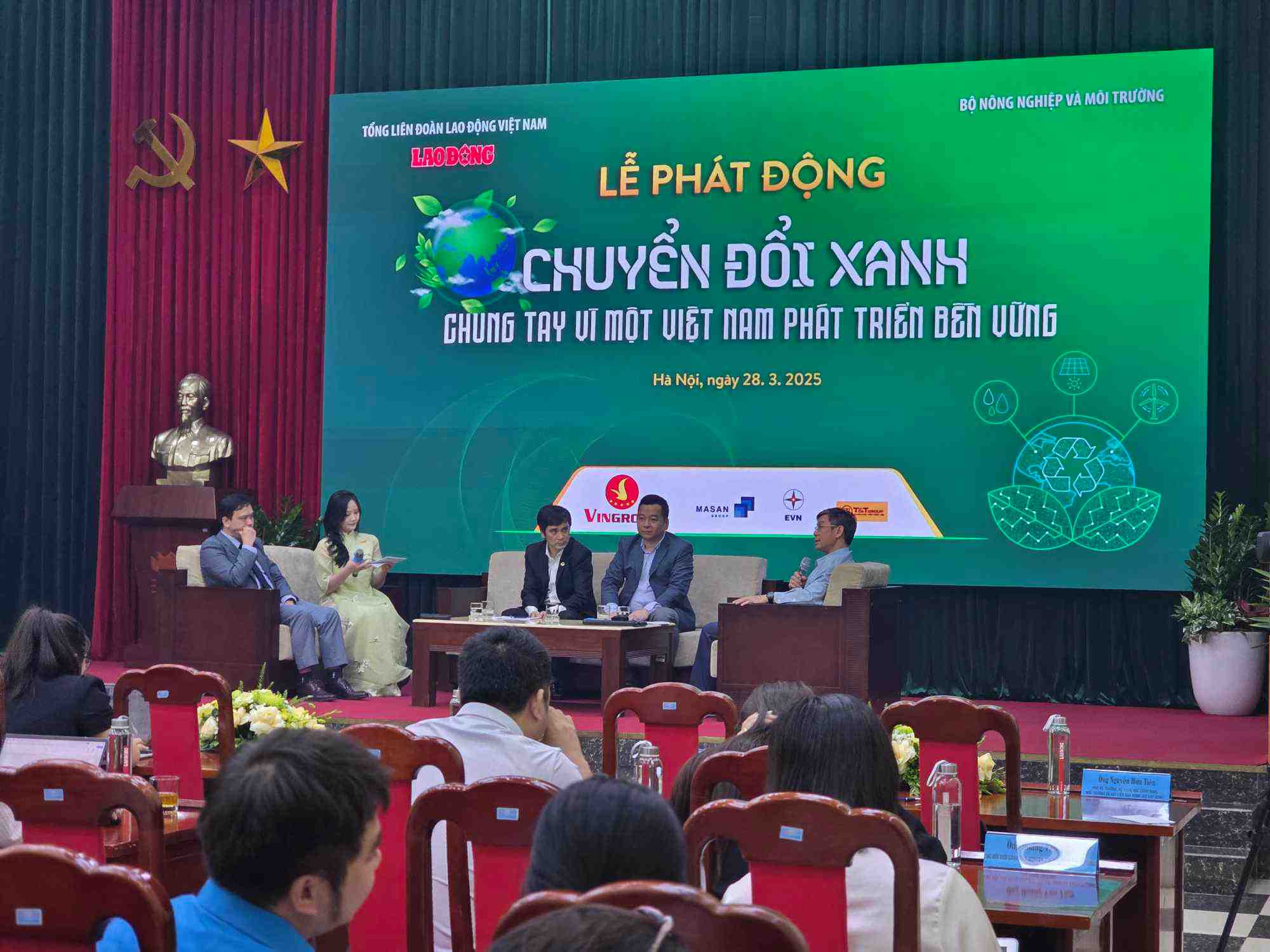
Green transformation is a race to strengthen economic sectors
9:33: Dr. Nguyen Quoc Viet - Lecturer at the University of Economics, Vietnam National University, Hanoi: Vietnam we are facing a great opportunity when the Party and Government are determined to shift the economic structure, transform the growth model, create new growth momentum combined with environmental protection, and implement the Net Zero commitment by 2050.
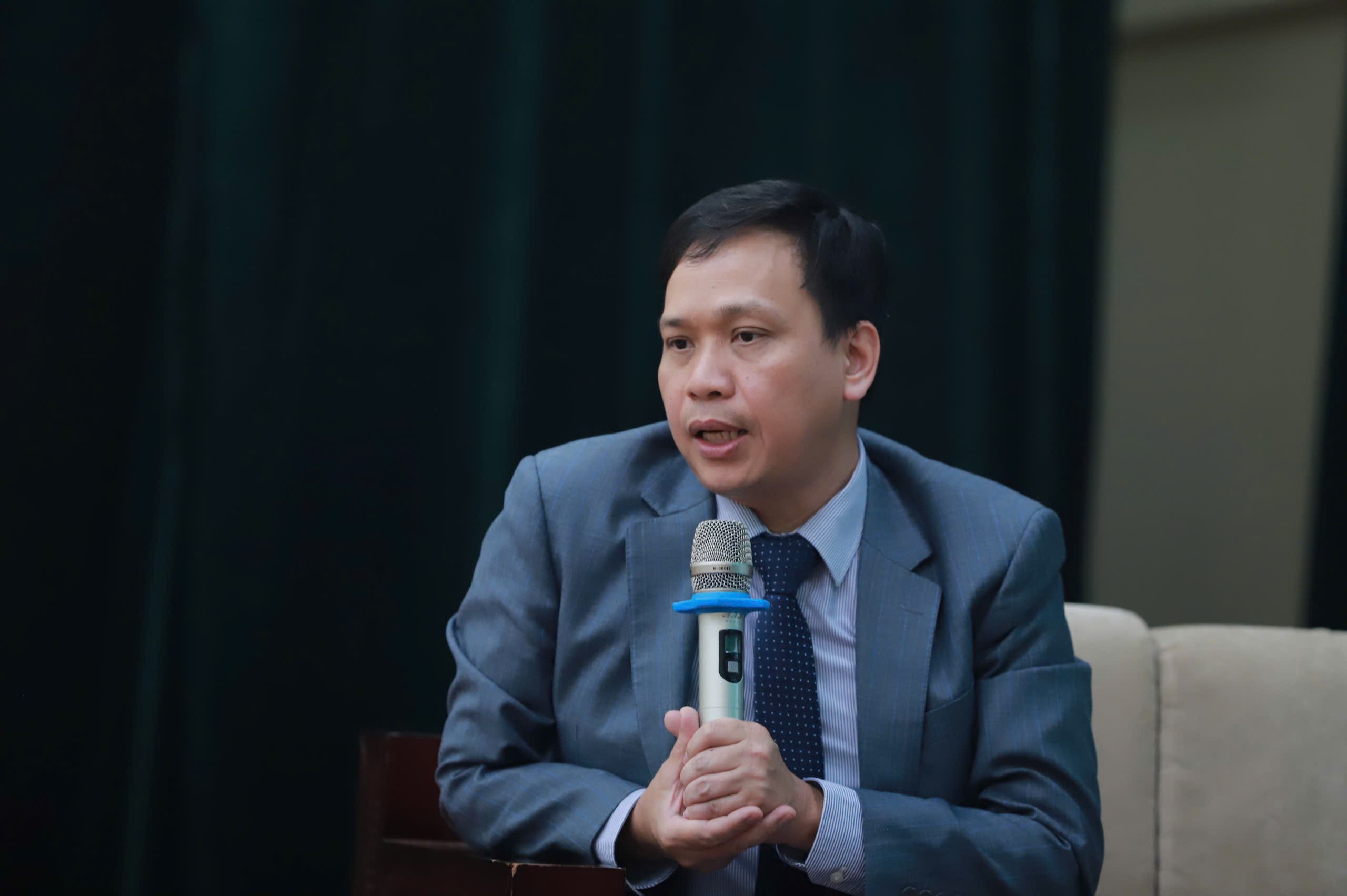
This is no longer a matter of acknowledging or hesitating but a must, adapting to transformation, or in other words, the race of businesses. I think this is not a competition, but a competition for support between economic sectors, between different enterprises in the value chain.
This reassessment race is throughout, there are things that can be done this year or in the coming years, there are things that need to be divided into roadmaps and time, to give all people and businesses support in the period from 2030 to 2050.
Currently, businesses have integrated very quickly in all aspects, from processing to the food industry, services...
Basically, businesses are adapting and initially participating in that process. Obviously, green transformation, environmental protection, resource saving, and the application of the circular economic model will help businesses increase production, helping businesses participate deeply in the global value chain and exports. Another point that businesses benefit greatly is that brands and products are certified as green, overcoming tariff barriers...
For Vietnamese people, when they reach a higher income, their consumption demand will also be higher, enjoying high-value products and services.
In addition, if businesses know how to take advantage of opportunities, understand global and domestic mechanisms and institutions, businesses will receive active support from the state, from investors or access capital sources from abroad.
However, opportunities will come with challenges for businesses such as technology transformation, capital access, etc.
In fact, from awareness to action is the result of a process, in terms of business model, human resources, and management capacity in each enterprise are different. I think this is an issue that needs attention.
Regarding industrial access, requiring businesses to transform is not easy.
Countries or global businesses can easily transfer technology to us, while the culture of connecting schools, research institutes, and businesses to deploy or learn is still limited.
The key point is that our institutions and policies have not really kept up with the transformation capabilities and needs of both the economy and businesses.
For example, regarding the green transformation institution to classify industries and fields to prioritize investment, credit... we do not have that mechanism.
For example, regarding carbon credits, the market requires transparency, reducing transaction costs... we are in the process of struggling. I think we need to research, exchange, and discuss between businesses, policy-making agencies, researchers, etc. to open up opportunities, new doors, reform institutions, and have policies in line with green transformation.
Hanoi launches green transformation, towards a sustainable development future
9:15: Mr. Nguyen Dinh Hoa - Deputy Director of the Hanoi Department of Agriculture and Environment - affirmed that this is an important milestone in the journey to build a green economy of the capital and the whole country. The event demonstrates Hanoi's strong determination to play a pioneering role, towards a sustainable development future with net zero emissions.
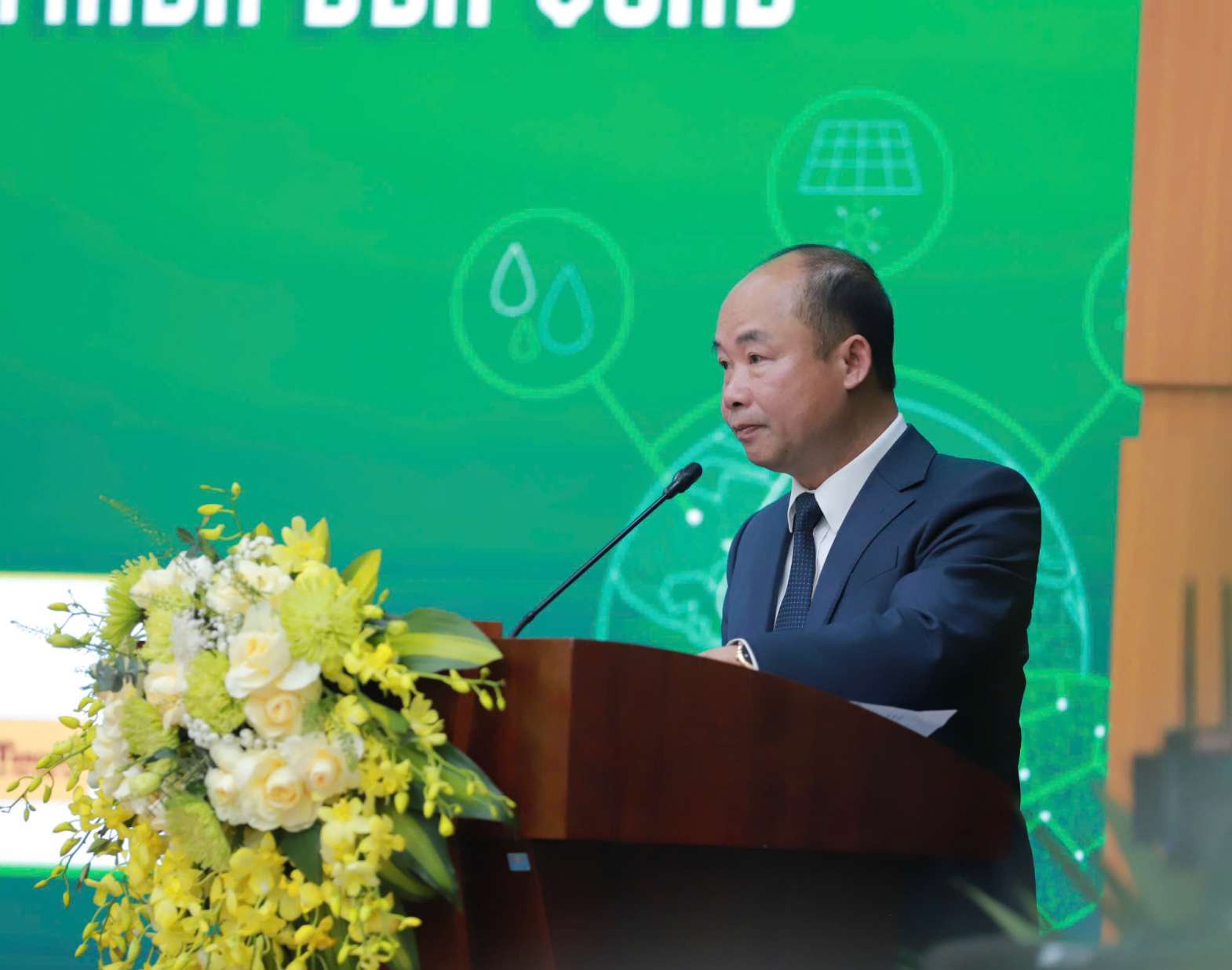
Speaking at the ceremony, Mr. Hoa emphasized the urgent need to change the mindset in environmental protection - from " exploitation" to "protection". According to him, to achieve this, each individual needs to start with specific, practical actions such as planting trees, maintaining environmental sanitation, classifying and recycling waste at source.
As the capital, Hanoi has been implementing many action programs to realize the Net Zero goal. In which, green transportation is identified as a key area. The city is strongly promoting the development of a modern public transport system, including electric buses, urban railways, bicycle lanes and environmentally friendly walking areas.
According to Mr. Hoa, these solutions not only contribute to reducing greenhouse gas emissions and air pollution but also help restructure the transportation system in a smarter, more convenient and sustainable direction for people.
Another notable direction is the construction of low-emission zones. In the immediate future, the city will pilot in Hoan Kiem and Ba Dinh districts - areas with high traffic density and great environmental pressure. After the testing phase, this model will be expanded to other districts.
In addition, Hanoi also promotes waste recycling and management solutions, especially in industrial parks. The goal is to reduce emissions from production, transportation, construction and daily life activities, while improving air quality, limiting fine dust and factors that harm public health.
Mr. Hoa also emphasized the role of international cooperation in the process of sustainable development. The capital is actively learning and applying "green city" models from many advanced countries, gradually controlling emission sources and improving people's quality of life.
The leader of the Hanoi Department of Agriculture and Environment called for the support of the whole society: "The success of the green transformation program cannot only come from the efforts of the government, but requires the active participation of each citizen and each organization. Every small action today will contribute to creating a green Hanoi - for a green, clean and sustainable Vietnam".
Green transformation is a shared responsibility and a new growth driver of Vietnam
9:08: Speaking at the opening ceremony of the launching ceremony "Green transformation - Joining hands for a sustainable Vietnam", Deputy Minister of Agriculture and Environment Le Cong Thanh emphasized that this is not only a meaningful event for the agricultural and environmental sector, but also plays an important role for the community, businesses and individuals in society.
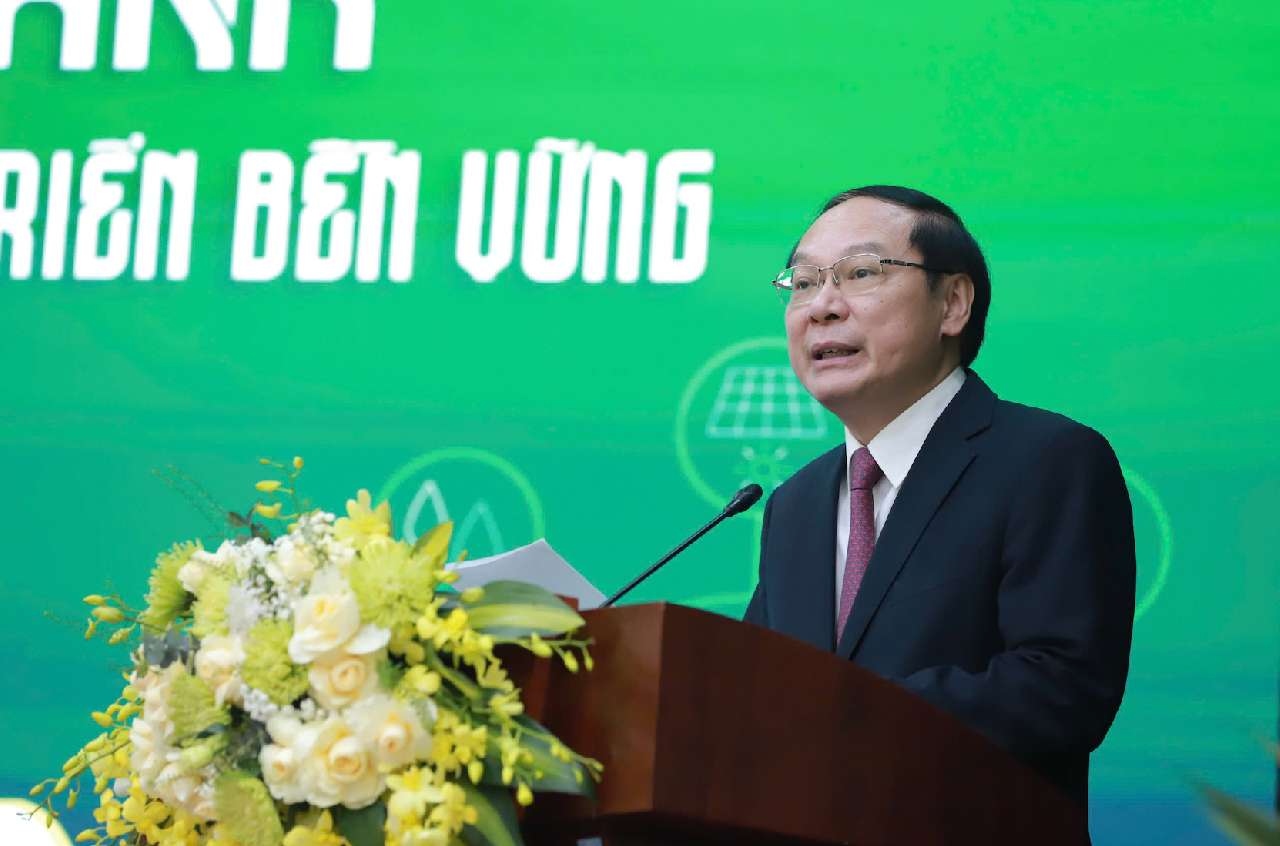
According to the Deputy Minister, green transformation is no longer a single choice or trend, but has become a mandatory requirement in the context of Vietnam facing a series of challenges from climate change, environmental pollution, decline in natural resources and extreme climate phenomena. These factors are directly affecting people's lives and the orientation of sustainable development of the country.
We clearly see that many businesses have considered green business as a competitive strategy, especially large corporations and foreign-invested enterprises are actively switching to a low-carbon economic model. However, most small and medium-sized enterprises are still confused, even not fully understanding the nature and role of green transformation, Mr. Thanh commented.
Citing the viewpoint at the 13th National Party Congress, he said that green transformation along with digital transformation are identified as two fundamental factors for Vietnam to become a developed, powerful and prosperous country by 2045.
The Government has been stepping up action with the National Strategy on Green Growth for the period 2021-2030, with a vision to 2050, along with specific action plans. Most recently, Directive 44/CT-TTg dated December 9, 2024 of the Prime Minister, requesting to promote the implementation of green growth solutions. In particular, the Ministry of Agriculture and Environment plays a key role in environmental protection, nature conservation, improving mechanisms on carbon credits, environmental criteria and promoting a circular economy.
Another important milestone is Decision 232/QD-TTg signed by Deputy Prime Minister Tran Hong Ha on January 24, 2025, approving the Project to establish and develop a carbon market in Vietnam. The goal is to promote greenhouse gas emission reduction at optimal costs, while creating new funding for green development activities, towards net zero emissions by 2050.
Mr. Thanh also added that relevant ministries and branches are urgently completing the legal framework to pilot a carbon trading floor before June 2025, while improving the capacity of state management and market participation of businesses and the community.
However, he also frankly acknowledged the current shortcomings in the green criteria system in Vietnam. Many new green project categories are for reference only, lacking a basis for classification according to screening criteria or international standards. Banks also have difficulty funding environmentally friendly projects because there is no clear set of criteria, he said.
Faced with that reality, the Ministry of Agriculture and Environment has submitted to the Prime Minister a Draft Decision to issue environmental criteria for investment projects granted green credit and issued green bonds, as a legal basis for evaluating, confirming and promoting the development of projects with clear and transparent environmental benefits.
Green transformation is not an individual problem, but a common responsibility of the whole society, Deputy Minister Le Cong Thanh affirmed. He expressed his hope that the launching ceremony and series of events of Green Transformation Day 2025 will create a strong influence, raising awareness of the community, businesses and stakeholders about the key role of sustainable development.
We hope to listen to recommendations and initiatives from experts, businesses, and people to jointly remove bottlenecks in the green transformation process, especially creating a favorable environment for investment in green fields, contributing to improving public health and ensuring national energy security, said Mr. Thanh.
He also believes that, with the determination of the Government and the consensus of the whole society, green transformation will not only be a trend but will become a new growth driver, helping Vietnam achieve the GDP growth target of over 8% by 2025 and aim for double-digit growth in the following years.
Green transformation is an urgent requirement, no longer a trend
9:05: Mr. Nguyen Duc Thanh - Deputy Editor-in-Chief of Lao Dong Newspaper emphasized: Green transformation is no longer a trend, but an urgent requirement towards a sustainable Vietnam.
According to Mr. Thanh, this is not only a global responsibility but also a great opportunity for Vietnam to make a breakthrough, develop a green economy, improve the quality of life of people and affirm the national position in the international arena.
In fact, Vietnam is facing many serious environmental challenges, as it is in the top 10 countries with the highest air pollution index in Asia. The transition to a green economy is expected to not only help reduce negative impacts on the environment but also open up new growth momentum, promoting industries such as renewable energy, clean technology - sectors that are increasingly playing a key role in the future.
To raise public awareness and promote practical action, the Vietnam General Confederation of Labor, Lao Dong Newspaper in coordination with the Ministry of Agriculture and Environment organized a series of events on Green Transformation Day in 2025.
Today's launching event is considered an important first step, laying the foundation for a series of in-depth seminars scheduled to take place in March, April and May. These seminars will focus on removing barriers and finding practical solutions to promote green transformation in Vietnam.
Mr. Thanh also expressed his hope that this series of events will become an annual program of practical significance, associated with the interests of people, businesses and the country.
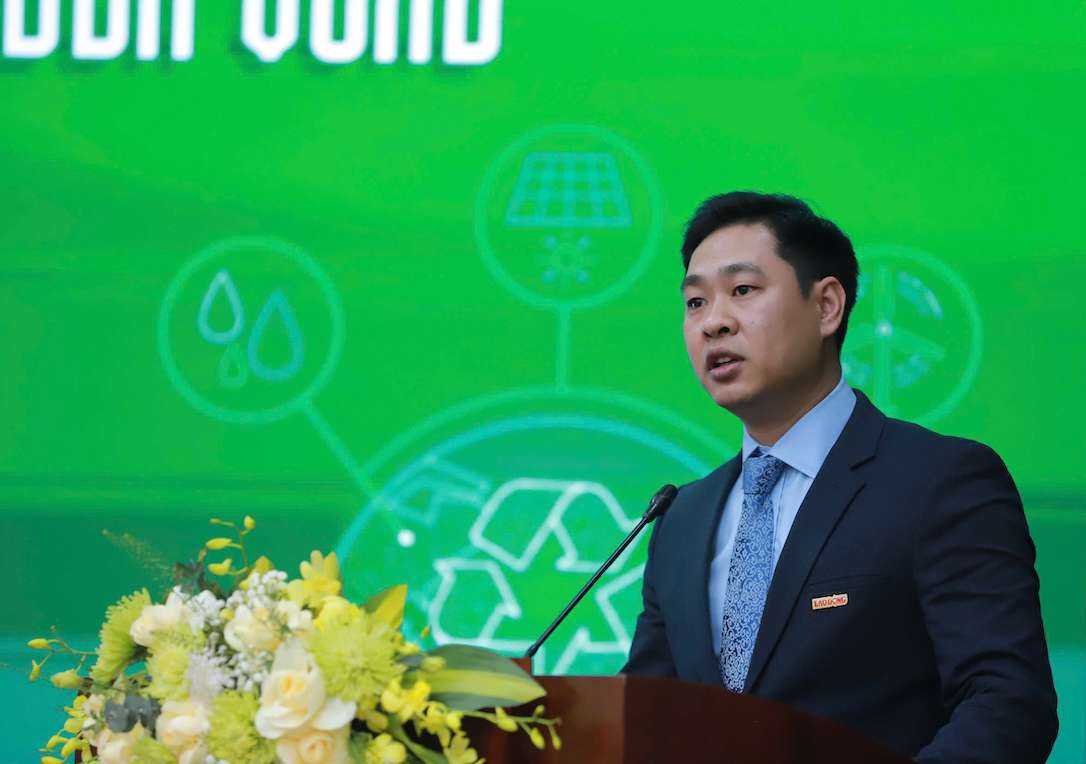
Green transformation is not only a global trend but also an urgent requirement in the context of increasingly serious climate change. Challenges such as environmental pollution, depletion of natural resources and increasing extreme climate phenomena are directly affecting people's lives and the sustainable development of the economy.
Recently, many businesses have chosen green business as a strategy and competitive advantage for themselves. Many large corporations are actively implementing green transformation to respond to climate change and develop a low-carbon economy, towards the Net Zero goal.
However, this change mainly occurs in large enterprises and foreign-invested companies. Meanwhile, many small and medium-sized enterprises are still confused about green transformation, although this is not only a trend but also a mandatory condition for export goods.
The launching ceremony of "Green Transformation - Joining hands for a sustainable Vietnam" promotes propaganda, raising social awareness of the role and importance of green and sustainable economic development, and at the same time calls for the cooperation of social organizations in green transformation.
At the same time, create a forum for management agencies, experts, businesses... to discuss, analyze and propose solutions to remove barriers for businesses, towards a green economy and a sustainable economy.
The launching ceremony was attended and chaired by leaders of the Ministry of Agriculture and Environment, leaders of the Vietnam General Confederation of Labor, representatives of the Ministry of Construction, leaders of the Department of Agriculture and Environment of Hanoi City, representatives of a number of relevant agencies, leaders of enterprises, economic experts and press and television agencies.
The launching ceremony of "Green Transformation - Joining Hands for a Sustainable Vietnam" was held at the Editor-in-Chief of Lao Dong Newspaper, Hanoi. Live television on Lao Dong dien tu, Fanpage of Lao Dong Newspaper.





